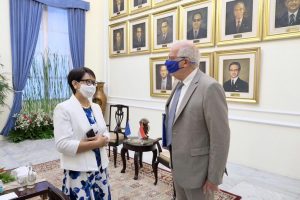During a visit to Indonesia, the European Union’s foreign policy chief Josep Borrell has called for a deepening of relations between Indonesia and the European bloc in order to manage in the strategic turbulence of increased “confrontation” between the United States and China.
Borrell, formally the EU’s High Representative for Foreign Affairs and Security Policy, visited Jakarta for meetings with Indonesian officials, including a courtesy call on President Joko Widodo. He also met with Lim Jock Hoi, the secretary-general of the Association of Southeast Asian Nations (ASEAN).
“The history of mankind of the 21st century will be written in the Indo-Pacific area. We have to be aware of that,” he said during a joint press statement with Indonesian Foreign Minister Retno Marsudi yesterday. “We have to be aware that the center of gravity of the world is no longer in the middle of Europe; it is here in the Pacific, in the so-called Indo-Pacific.”
After acknowledging the bilateral tensions that have attached to the issue of Indonesian palm oil production (in particular, its environmental and social impacts), Borrell said that in a turbulent strategic environment, Jakarta and Brussels had good reasons to deepen their relationship on the basis of “prosperity, sustainability, and security.”
“We have to work together on all three points, taking into account the new distribution of power in the world, the confrontation, if I can say, between China and the U.S., and look for a place in order to avoid new geopolitical tensions,” Borrell said. On Twitter, Retno said that she was “looking forward to continue working together with the EU to enhance regional and global peace, stability, and prosperity.”
While Borrell did not mention China explicitly in his comments, his visit reflects both the EU’s mounting concerns about the rising Asian superpower, and the resulting European turn toward engagement with the “Indo-Pacific.” In May of last year, Borrell told a French newspaper that China is “systemic rival that seeks to promote an alternative model of governance,” and that European nations had been “a little naïve” in their engagements with it.
This has provided the spur to an expansion of the EU’s relations with ASEAN and its member states. In addition to brokering free trade agreements with Singapore and Vietnam, EU and ASEAN recently agreed to upgrade their relations to a Strategic Partnership. In April the European Council adopted an outline for an EU Strategy for Cooperation in the Indo-Pacific, which has an aim of “contributing to its stability, security, prosperity and sustainable development, based on the promotion of democracy, rule of law, human rights, and international law.”
Alongside Brussels’ efforts, individual EU members states including France, Germany, and Netherlands, as well as the post-Brexit United Kingdom, have formulated their own “Indo-Pacific” strategies, each reflecting a combination of economic interest and concern about increasing Chinese assertiveness.
During his stop in Indonesia, Borrell and Retno also discussed the ongoing political crisis in Myanmar, with the European official offering support for Jakarta’s efforts to drag ASEAN into a more active role in resolving the crisis. “I am very much sorry that the situation there is not solved, but if someone can help it is ASEAN, and inside ASEAN, Indonesia,” he said.
His comments came ahead of a visit to Myanmar this week by ASEAN Secretary-General Lim Jock Hoi and Erywan Yusof, the second minister for foreign affairs for Brunei, a trip that marks an important step forward for ASEAN, but also highlights the steps that the Southeast Asian bloc has been unable or unwilling to take.
On April 24, ASEAN convened a special Leaders Meeting to address to Myanmar crisis, establishing five points of consensus about the crisis in Myanmar. Since then, however, there has been little progress on any of the five points, especially on the lowest-hanging fruit: the appointment of a special envoy. This has come amid reports that ASEAN member states are divided on the best way of addressing the crisis in Myanmar.
During her portion of the joint press conference with Borrell yesterday, Retno appeared to give vent to her impatience with her fellow ASEAN members for the bloc’s slow progress. “The appointment of a special envoy must be immediately made and communication among all parties must start,” she said.
A similar urgency was expressed by the U.S. Deputy Secretary of State Wendy Sherman, who visited Jakarta on a regional tour on May 31. “There is no time to waste, as we all see the humanitarian crisis for the people in Burma,” she told reporters in Bangkok.

































